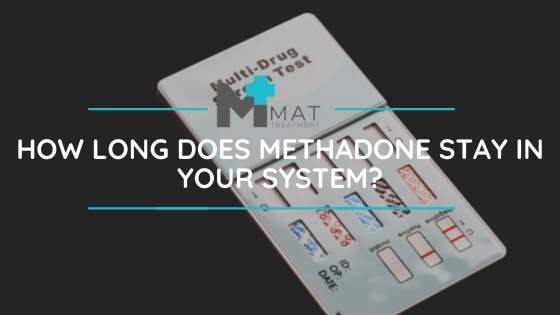Table of Contents
In 2017, 1 out of every 8 adults struggled with both alcohol and drug use disorders.
Drug addiction in America is an ongoing problem that millions of people and their loved ones suffer through daily. If you or someone you know is dealing with drug addiction, the first step is to seek rehabilitation and do drug detoxification.
Part of the detox process is withdrawal and one of the most common medicines prescribed for it is methadone but how long does methadone stay in your system? This comprehensive guide will explain.
Let’s get started.
Table of Contents
Basics of Drug Detoxification
Drug detoxification involves eliminating the drug or alcohol from the body. It means completely quitting the substance and letting your body naturally cleanse itself. During detoxification, you can go to a medical professional or facilitate it yourself.
It is inadvisable to do it on your own. Going to a medication-assisted rehabilitation center will allow you to be in a safe environment where you can be monitored and treated based on your own needs.
One of the most parts of the detox is withdrawal. This occurs when the brain isn’t receiving the same addictive properties from the drugs and it has to balance out which causes a lot of unpleasant side effects.
Some of the more mild side effects of withdrawal include:
- Anxiety
- Insomnia
- Flu-like symptoms.
- Nausea
- Diarrhea and other digestive problems
- Hot and cold flashes.
- Sinus issues
- Constant sweating
- Muscle cramps and body aches
While the more serious side effects include:
- Seizures
- Hallucinations
- Delirium
Since going through withdrawals can take a physical and emotional toll, different medications are prescribed to ease the burden. One of them is methadone.
What is Methadone Used For?
Methadone is an opioid medication frequently used to treat pain. It is particularly for people suffering from drug addictions. It contains elements of similar drugs that those individuals are addicted to and assists them with their withdrawal symptoms.
Methadone is most commonly used with patients who are addicted to opiates. It works by tackling the specific part of the brain and nervous system that opioid use effects. Essentially, methadone can block the pleasure receptors that are fired during drug use.
This has the potential to reduce the strong cravings for drugs as well as lessening the potential for relapse. Since it’s typically less expensive than morphine, it’s a good option to prescribe to individuals with long-lasting pain when nothing else has worked.
How Long Does Methadone Stay in Your System?
The length of time that methadone stays in your system varies between individuals and different conditions. Here are some of the factors that affect the length of time methadone stays in your system.
Your age, weight, and metabolism play a huge role in how quickly the drugs leave your system. If you’re older, overweight, or female it tends to take longer for you to get rid of methadone.
Outside of genetic and lifestyle factors, the length of time and the dosage of methadone also impacts how long it stays in the body. Someone who has used high doses of methadone for long periods of time will take longer to get rid of it than someone who has taken a low dose for a short amount of time.
Another element that people don’t think about is the health and function of the kidneys and liver. They’re responsible for getting rid of unwanted substances from the body so if they’re not working, it’ll take longer for methadone to be eliminated.
Most sources conflict with one another in terms of the average time it takes to get rid of methadone in your system. The average amount of time it takes for the body to completely get rid of methadone is around 2-13 days.
Methadone Drug Testing
Even if methadone is cleared out in less than 14 days, it can show up on drug results for much longer. The most common things used for testing are urine, blood, hair, and saliva. Standard tests can easily detect opioids but testing for methadone is more specific and costly.
Urine Test
The most common type of drug test for methadone is a urine test. The detection of methadone in urine can be from one hour to two weeks after the last ingestion. Most medical professions prefer to use a urine test since it is the most affordable and least invasive option.
Blood Test
Blood tests can detect methadone within 30 minutes of last use. These tests are expensive but also very accurate. Unfortunately, due to their short detection window, they are not often the best choice to use for methadone testing.
Hair Test
For long-term methadone use, a hair test is the best option. Methadone often will leave traces in hair and so if someone has been using it for a while, it can be tested through their hair. Those who recently started using methadone won’t have it appear in their hair for at least a couple of weeks.
Saliva Tests
For a convenient option that is not as invasive as the blood test, saliva tests are a good option. They can detect methadone 30 minutes after ingestion and stay there for a few days after use. It’s also a commonly used test.
Methadone Side Effects
Since methadone shares a lot of similarities with opioids, it’s natural they share some of the same side effects. Some of these include:
- Constipation
- Feeling dizzier than usual
- Sleepiness
- Nausea
- Confusion
- Memory loss
- Impaired balance
Methadone can be really wonderful as a treatment but you can still overdose on it. It can be fatal to get addicted to methadone, drug overdoses are common.
To reduce the risk of permanent damage or death, methadone should only be administered by a medical professional in a controlled setting.
Methadone Used for Drug Detoxification
To combat the drug addiction problem we have in America, it’s important to normalize discussions about addiction and treatments. If you or someone you love is battling with drug addiction, know that there is hope.
Taking the step of seeking drug detoxification is a good start. One of the medicines they might prescribe you is methadone so it’s important to know how long does methadone stay in your system and the side effects you might experience.
Remember that no matter where you are on this personal journey, there’s always a support system ready to help.
If you found this informative and are looking for similar content, check out our blog!
Get Help Today
Don’t go through the process of recovery alone. There are people who can help you with the struggle you’re facing. Get in touch with one today.



